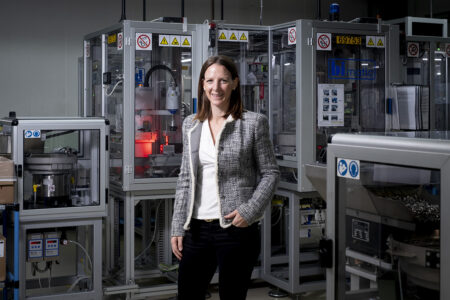Founded in 1976, Cebi designs and manufactures electromechanical solutions for the automotive, household appliances, and ventilation sectors. Its product portfolio includes actuators, temperature sensors, and locks, with Cebi recognised as a world leader in actuators and automotive washer systems, and the European leader in temperature sensors and closing systems.
Today, the group operates 7 R&D centres, 11 production sites and 6 sales offices across the world. “We have always placed innovation and technology at the heart of its business strategy,” explains Member of the Executive Board, Lynn Elvinger.
We have always placed innovation and technology at the heart of our business strategy.
 The company has a strong presence in Luxembourg, with four key structures. A competence centre that serves as the hub for innovation and development of its products, and where engineers design new sensors in response to customer demands. It also runs a local production plant manufacturing components that supplies virtually all the thermostats assembled by European carmakers, and the majority of temperature regulators fitted in European washing machines, tumble dryers, dishwashers and irons.
The company has a strong presence in Luxembourg, with four key structures. A competence centre that serves as the hub for innovation and development of its products, and where engineers design new sensors in response to customer demands. It also runs a local production plant manufacturing components that supplies virtually all the thermostats assembled by European carmakers, and the majority of temperature regulators fitted in European washing machines, tumble dryers, dishwashers and irons.
In addition, its international base in Luxembourg serves as the group’s headquarters, providing support and coordination across all its locations. Finally, its testing arm provides laboratory services to manufacturers and companies in their research and development.
State-of-the-art testing laboratory
In 2021, it inaugurated a testing facility in Luxembourg to bring together its R&D departments, enhancing collaboration between product and process specialists. The lab aims to offer testing services to third party companies in the region. “We keep extending the offer of testing services ranging from 3D printing, material analysis, mechanical, climatic, environmental or thermal shock testing to electromagnetic compatibility testing,” says Ms Elvinger. “We just invested in a Shock Response Spectrum testing module, which assesses the impact resistance of products and systems, especially for industries such as aerospace, automotive, and construction. The lab has already opened doors to new business relationships, bringing us into contact with players we hadn’t collaborated with before, especially in Luxembourg.” These connections have, in turn, led to new opportunities for knowledge-sharing and discussions around product applications, innovations and even subsidies.
Strong support of the industrial ecosystem
As part of the biggest advantages Luxembourg offers as a business location, Ms Elvinger highlights: access to cutting-edge technology and advanced research facilities, a central position in Europe, a highly skilled and multilingual workforce, and a business environment that encourages innovation and development, among others.
Local partnerships within the country’s dynamic ecosystem have been particularly key in its continuous growth and innovation. The group has leveraged the country’s network of innovative startups and high-tech companies to access world-class expertise and cutting-edge technologies.
This ecosystem has enabled Cebi to forge strategic partnerships, exploit synergies, and work towards Luxembourg’s broader industrial vision.
Industry organisations like the multisectoral business federation FEDIL and automotive supplier association ILEA, have promoted collaboration with local manufacturers. The University of Luxembourg has also provided access to specialised talents and recruitment opportunities. The national innovation agency, Luxinnovation, additionally fosters a favourable climate for industrial development to thrive.
“This ecosystem has enabled Cebi to forge strategic partnerships, exploit synergies, and work towards Luxembourg’s broader industrial vision,” points out Ms Elvinger. Over the next 5-10 years, the company aims to navigate the automotive industry’s transformation and explore new markets.
Photo credits: Luxinnovation/Jessica Theis
